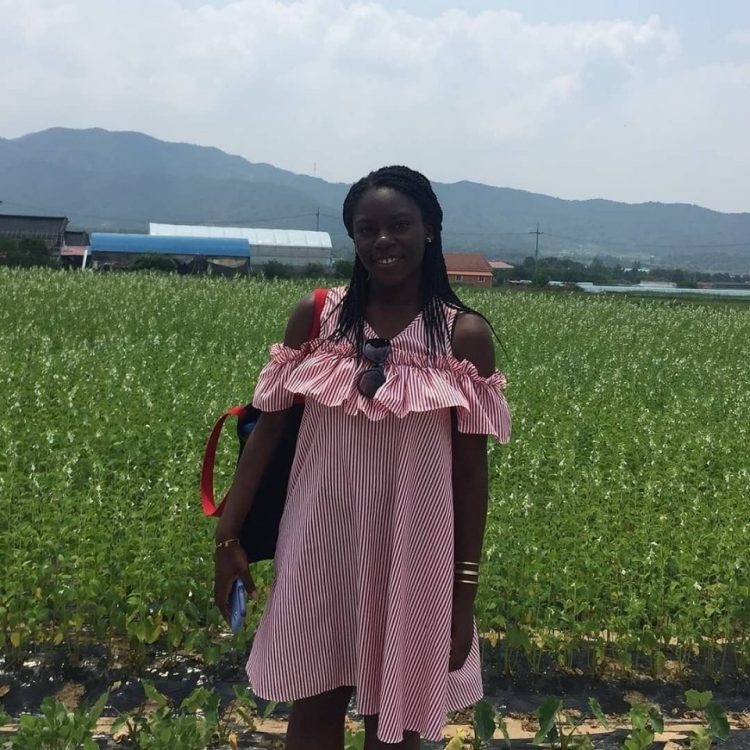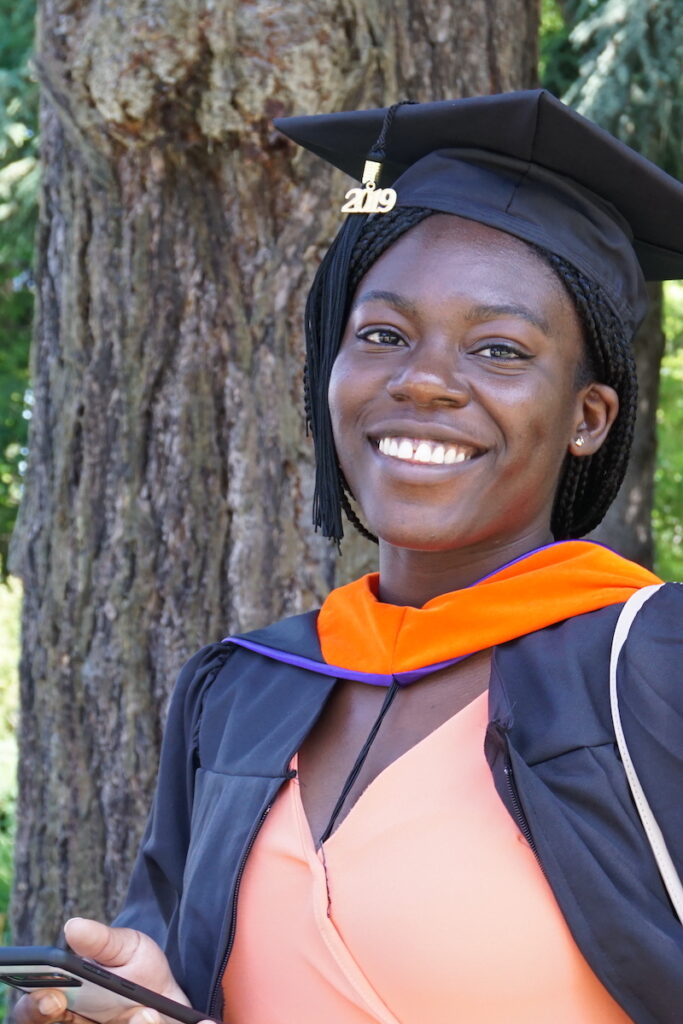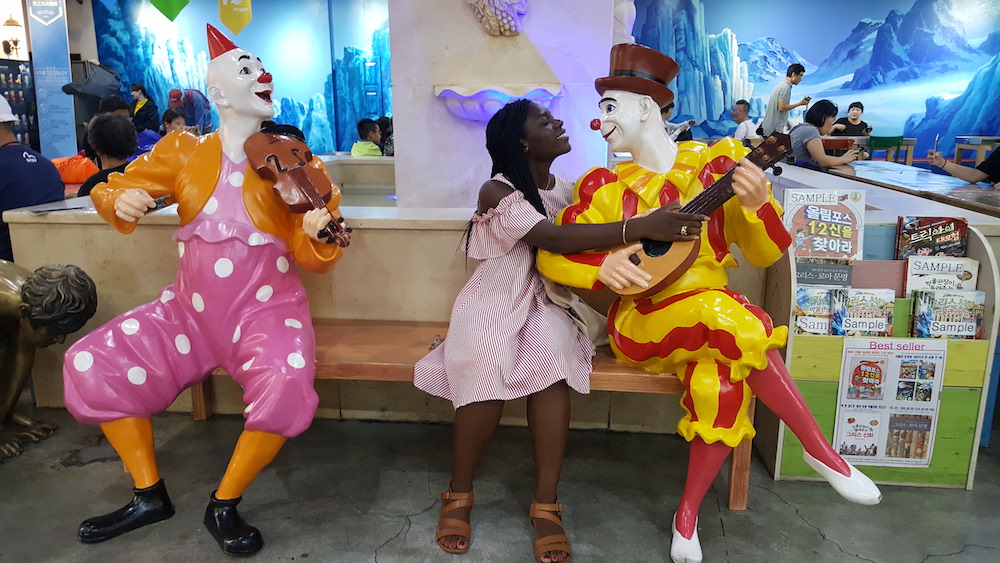Have you ever had a goal or dream so ambitious it felt impossible to reach? Many of us have stepped away from an ambition simply because the steps to reach it were unclear.
Isy Okafor, a recent graduate who earned her master’s in materials science & engineering, has set an example for how small steps — such as using YouTube to learn a new language — can lead to more opportunities and, eventually, a goal realized.

Isy taught herself Korean as an undergraduate student, and tested into intermediate-level Korean courses as a master’s student at the UW. Last summer, she was awarded a Critical Language Scholarship — a scholarship managed by the U.S. State Department to support the study of languages critical to U.S. interests. She was also awarded the Foreign Language and Area Studies Fellowship, and, using the fellowships back-to-back, spent all of last summer in Korea doing intensive language study.
On a very busy day last March — in between taking an exam and preparing for a job interview — Isy found out she was awarded the prestigious Blakemore Freeman Fellowship to study Korean in Busan, South Korea. We spoke with Isy about how she taught herself Korean, her previous experiences in Korea supported by two language fellowships, and how language learning enriched her time as a graduate student.
What was it like to teach yourself Korean? What was challenging about this process, and what was rewarding? What tools did you use?
It was fun teaching myself Korean! When I first started learning, I picked up vocabulary very quickly and it felt very good when I would watch a T.V. show and hear a word or grammar point that I recently learned. Occasionally, I would get upset if I kept studying something repeatedly and it wouldn’t stick. When that happened, I refused to move on until I got it, but since I was frustrated it made it even harder for me to learn it. It wasn’t until I adopted the attitude of “If I don’t get it the first time it’s okay, I’ll read other things and come back to that topic later” that my self-study became easier and even more enjoyable.
My study tools included a travel-oriented beginners’ book, Instagram, and a lot of Youtube. I mostly watched comedy sketches because I like seeing how different languages and cultures perceive humor. I like to think I’m pretty funny in English but it doesn’t quite translate well to Korean; so, one of my goals is to get a handle on Korean humor so I can tell jokes in Korean as well.
Why did you start learning Korean? Was it out of passion and interest, or a specific career goal, or both?

I was first introduced to Korea in my middle school history class. I found it fascinating how fast South Korea modernized after the Korean War to become what it is today. After reading more about their history, I started learning about Korean culture and found a lot of similarities between Korean and Nigerian culture. I have also always been interested in engineering and seeing as how South Korea is home to many top semiconductor/electronics companies, it almost seemed like fate being introduced to Korean culture. I feel lucky that my interests and career aligned because often times people feel forced to choose one over the other, and in my case, I can pursue both to the fullest.
What was it like to spend a summer in Korea? What did you gain from that experience, and how have those skills influenced your approach to your studies or work?
To be honest, I found living in Korea to be an amusing experience. Again, I saw so many similarities between Korea and Nigeria, not only in the culture but also in the society and even the traffic! Korea was very different compared to anywhere I’d ever been before, yet it felt familiar at the same time. This gave me more room to learn about the more nuanced parts of the culture and how Korean society functioned.
I had applied for the Critical Language Scholarship the year before and was rejected, so getting into the program last summer was a dream come true. I had no intentions of wasting the opportunity, so I spoke to anyone and everyone who would listen to my poorly structured, child-like sentences. If I was lost, which happened pretty often, I would ask strangers for directions. If I didn’t understand what was going on, I would ask the nearest person to explain it to me. During my year of self-study, I only read and wrote so my speaking skills were almost non-existent. The following year at the University of Washington, I worked with my Korean professor, EunYoung Won, to improve my speaking, but I was still miles behind the other students. However, after my summer in Korea, my speaking skills improved tremendously. My time abroad taught me that it’s very important to ask questions, no matter how trivial you think they may be. For the most part, people won’t be frustrated with you for putting in effort in your language studies.
Looking back, I’m glad I didn’t get CLS the first time around. The old me wouldn’t have had the self-confidence to throw myself into Korean culture and society they way current me would.
What tips would you give to a fellow student who is applying for language study fellowships such as the Foreign Language and Area Studies Fellowship or the Critical Language Scholarship?
To anyone applying for FLAS or CLS, I would tell them to think about the reason they are pursuing this opportunity and establish whether or not this experience will help you achieve your goals. Make sure you really know yourself. When I compare my rejected CLS essay to the one I was awarded with, I can see a stark difference in my level of introspection.
What will the Blakemore Fellowship allow you to do? How will this impact your career opportunities and your approach to your work?
This fellowship will allow me to solely dedicate my time to studying Korean. I will also have the opportunity to explore Korea’s engineering industry, and I can dedicate time towards discovering specific companies/sectors that I would like to apply to in the future. I hope to collaborate with Korean research institutes, and having a strong background knowledge in Korean culture will lead me to be successful in these pursuits.
How have you navigated balancing your studies in engineering with pursuing language work? How do you talk about these priorities with your colleagues who may not “get” these interests?

Although I enjoy engineering, it cannot be the only thing I do 24/7. Pursuing other interests keeps me balanced and I strongly encourage others to step outside their field and diversify their activities. This helps avoid burn out and regrets later in life. If you have the opportunity to explore other things, you should take it because many years down the road you’ll have no one to blame but yourself, and that kind of regret will eat at you like you wouldn’t believe.
To be honest, I did not tell my colleagues about my language studies. I applaud those who find happiness focusing everything on engineering, but for me that’s just not the case. Based on my interactions, I could tell that me pursuing other interests, especially language, would not be received well so I kept it to myself.
What advice would you give to a graduate student who wants to “break from the mold” of what’s expected in their department?
You don’t have to be alone when you decide to step outside of your department and deviate from the norm. Although I didn’t have any colleagues I could share this with, I found a very strong support group in my Korean class. I went into this thinking I would be taking this language journey alone, but I was very wrong. I’m very thankful for my Professor Won. When I started class, I wanted to quit in the first week because I was struggling so much, but thanks to her encouragement I stayed. I barely passed the interview to enter Korean at level 2 – which put me very far behind my classmates and made me the only graduate student amongst undergraduates who had already formed friendships the year before– yet I still formed very close bonds with many of my classmates. To them, I am also thankful for their patience and understanding.